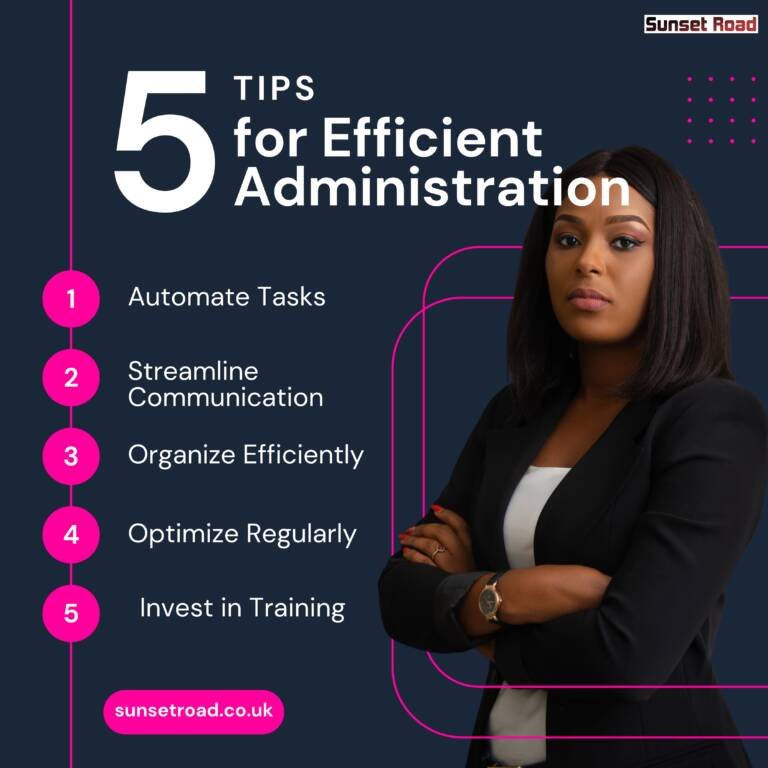How Efficient Administration Can Reduce Costs for UK SMEs

Efficient administration is the backbone of any successful business, especially for small and medium-sized enterprises (SMEs) in the UK. It helps streamline operations, reduce redundancies, and ensure resources are used wisely. For UK SMEs, managing costs is crucial to staying competitive, and a well-organized administrative function can play a pivotal role in achieving this. In this blog, we will explore how efficient administration can lead to cost reductions and provide real-world examples to illustrate the benefits for UK SMEs.
Reducing Redundancies in Operations
One of the primary ways efficient administration reduces costs is by identifying and eliminating redundant processes. Many SMEs operate with outdated or manual processes that may overlap or require excessive time and resources. By auditing administrative functions, businesses can identify where duplication occurs and implement systems to streamline workflows.
For example, a small accounting firm in Birmingham used to manage client records through both physical paperwork and digital files. This redundancy led to frequent errors, extra work, and wasted time for employees trying to reconcile data between the two formats. By shifting to a fully digital client management system, the firm not only cut the time spent on these tasks in half but also saved money on storage and office supplies. The streamlined process reduced operational costs and improved client satisfaction by ensuring faster, more accurate service.
Automating Routine Tasks
Automation is one of the most effective tools in an efficient administration. Routine administrative tasks such as invoicing, payroll management, and data entry can often consume valuable time that could be better spent on strategic activities. Automating these tasks helps reduce the workload on employees and minimizes human error, which can be costly if left unchecked.
Take the case of a medium-sized marketing agency in London. Before automation, the agency relied on manual invoicing, which not only took hours to complete but also led to delays in cash flow when errors were made. By adopting automated invoicing software, they cut invoicing time from several hours to minutes and saw a noticeable improvement in payment processing times. With fewer mistakes and faster payments, the agency improved its cash flow and reduced administrative costs associated with correcting errors and chasing late payments.
Enhancing Resource Allocation
Efficient administration ensures that resources are allocated where they are needed most. For SMEs, this means optimizing staff assignments, budgets, and time management to avoid unnecessary expenditures. Proper resource allocation can prevent overstaffing or underutilization of employees, leading to better cost control.
A retail SME based in Manchester was struggling with scheduling issues, often overstaffing during slow hours and understaffing during peak times. This resulted in both excess labor costs and lost sales opportunities. By implementing an efficient staff scheduling system, the business was able to accurately predict when more employees were needed and adjust staffing accordingly. This improved both employee productivity and the customer experience, leading to increased sales and a reduction in labor costs.
Cutting Office Supply and Overhead Costs
Another area where efficient administration can make a significant impact is in managing office supplies and overhead costs. Many SMEs inadvertently overspend on office supplies, utilities, and maintenance due to a lack of oversight or an organized system to track these expenses. Implementing better administrative controls over these expenditures can lead to immediate savings.
For instance, a small consultancy firm in Edinburgh conducted a review of their office supply purchases and discovered they were overspending on items like printer ink, paper, and cleaning services. After implementing an automated inventory tracking system and setting up bulk purchasing agreements with suppliers, they reduced their supply costs by 20%. Additionally, the company cut its energy bills by installing energy-efficient lighting and encouraging employees to adopt energy-saving practices. These administrative improvements resulted in significant savings on overhead costs.
Improving Compliance and Avoiding Penalties
In times of crisis, HR must also ensure Efficient administration also ensures that businesses remain compliant with regulations, which is especially important for UK SMEs navigating complex legal and financial landscapes. Non-compliance can lead to costly penalties, fines, and legal fees, which can severely impact a small business’s bottom line. Administrative functions that track deadlines, manage documentation, and ensure regulatory adherence are crucial for reducing the risk of non-compliance. that the organization remains compliant with legal and regulatory requirements. This includes understanding changes in labor laws, health and safety regulations, and employee rights that may arise during a crisis. Failure to comply with these regulations can result in legal repercussions and damage to the organization’s reputation.
A construction SME in Bristol faced fines for missing tax filing deadlines due to disorganized financial records and a lack of administrative oversight. After hiring a dedicated administrative manager and adopting tax management software, the company was able to stay on top of its filing obligations and avoid future penalties. The one-time investment in administrative support ultimately saved the company thousands of pounds in fines and legal costs, demonstrating the financial benefit of efficient administration.
Optimizing Procurement Processes
Procurement is another area where inefficient administration can lead to wasted resources and inflated costs. Many SMEs do not have the benefit of dedicated procurement departments, and as a result, their purchasing decisions may be disorganized or lack the necessary cost controls. By streamlining procurement processes, businesses can negotiate better deals with suppliers, avoid unnecessary purchases, and track inventory more effectively. A catering company in Leeds faced frequent challenges with over-ordering food supplies, which led to both wasted stock and increased costs. After implementing a centralized procurement system and training their staff to monitor inventory more closely, the company was able to negotiate bulk discounts with suppliers and significantly reduce waste. These administrative changes allowed the business to lower its procurement costs and improve its profitability without compromising on service quality.
Efficient Communication and Collaboration
Communication breakdowns within an organization can lead to costly mistakes, missed opportunities, and wasted time. Efficient administration includes implementing systems and processes that enhance communication and collaboration across departments. This ensures that everyone in the business is aligned on objectives, timelines, and responsibilities, which can significantly reduce operational inefficiencies and their associated costs. A tech startup in London struggled with internal communication issues, resulting in delayed project timelines and missed client deadlines. After adopting a project management software that allowed for better communication and collaboration between teams, the startup was able to complete projects faster and with fewer errors. The improved communication flow reduced project delays, improved client satisfaction, and saved the company money by avoiding costly overtime and rework.
Utilizing Outsourcing for Administrative Functions
For many UK SMEs, outsourcing certain administrative functions can be a cost-effective solution. Tasks such as payroll, HR management, IT support, and bookkeeping can often be outsourced to specialized service providers, allowing businesses to focus on their core competencies while reducing the overhead associated with managing these functions in-house. A recruitment agency in Liverpool decided to outsource its payroll and HR functions to a third-party provider. This allowed the agency to eliminate the need for a full-time HR staff member, saving on salary and benefits costs. The outsourcing provider also offered more expertise in handling payroll and compliance matters, reducing the likelihood of costly errors and ensuring the business remained compliant with employment laws. By outsourcing administrative functions, the agency was able to significantly reduce costs while maintaining high operational standards.
Conclusion
Efficient administration is a key driver of cost reduction for UK SMEs. From automating routine tasks and streamlining procurement to improving resource allocation and communication, efficient administration can help businesses optimize their operations and save money. By investing in administrative efficiency, SMEs can reduce redundancies, avoid costly mistakes, and allocate resources more effectively, leading to sustainable growth and improved profitability. In a competitive market like the UK, where SMEs face pressure to manage costs and deliver value to customers, efficient administration offers a clear path to operational efficiency and financial savings. The examples above demonstrate that with the right systems and processes in place, UK SMEs can achieve significant cost reductions while maintaining or even improving the quality of their services











